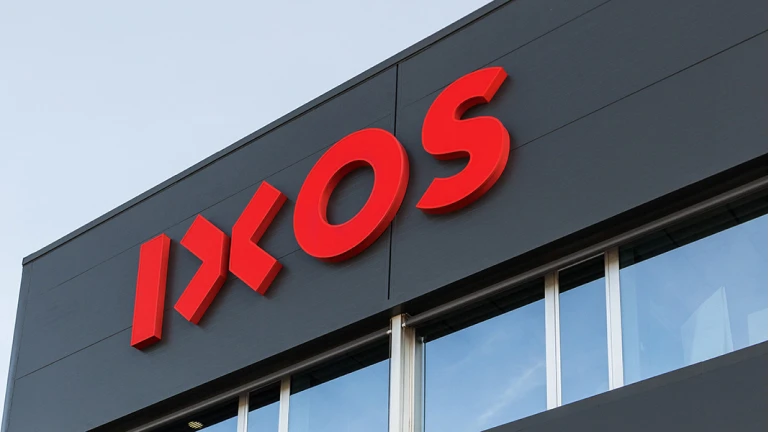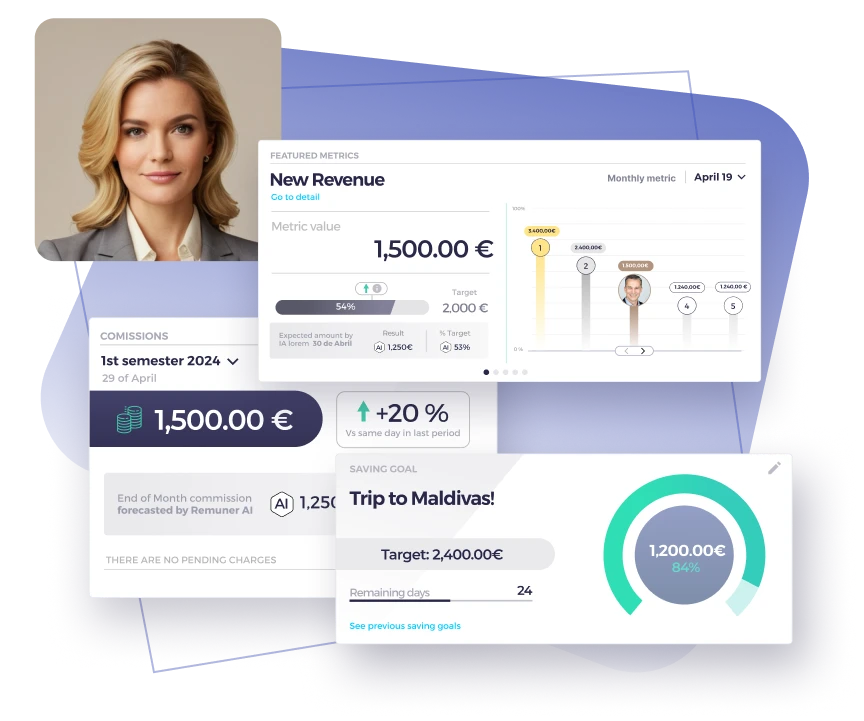Sales compensation typically revolves around two powerful tools: commissions and bonuses. Both serve as effective sales incentives, but they work in very different ways and impact sales performance uniquely. Understanding commission vs bonus is critical when building a compensation plan that aligns with your business goals and keeps your sales team motivated.
Table of contents
In this post, we’ll break down the differences between commission vs bonus, explain when to use each, and explore how they affect compensation, OTE, and quota attainment.
What is a commission? Definition and Example
A commission is a direct reward tied to individual sales performance. Salespeople earn a percentage of each sale they close. The more they sell, the more they earn. This structure directly connects effort to compensation and pushes reps to hit and exceed their quotas.
For example, if a sales rep has a quota of $100,000 per quarter and earns a 10% commission on sales, closing $150,000 in deals will result in a $15,000 commission. This clear link between sales and compensation motivates reps to push beyond their targets and often leads to higher OTE (on-target earnings).
What is a bonus?
A bonus is a one-time payment given for meeting specific targets or milestones. Unlike commissions, bonuses are not tied to every sale. Instead, they reward broader achievements like exceeding a quota, meeting annual goals, or driving business objectives.
For example, a company might offer a $10,000 bonus if a sales team reaches 120% of their yearly quota. Bonuses act as additional motivation to encourage sales reps to focus on longer-term goals or special projects.
Commission vs Bonus: Side-by-side Comparison
While both serve as sales incentives, there are important differences between commission vs bonus:
How to use commission vs bonus in sales compensation
Choosing between commission vs bonus depends on your compensation goals. Here’s a quick guide to when each makes the most sense:
Use commissions when:
- You want to drive individual performance: Commissions directly link earnings to effort, making them ideal for motivating individual sales performance. Reps know that more sales mean more money.
- Your sales cycle is steady: In industries with consistent sales cycles and frequent opportunities, commissions offer ongoing motivation to close deals.
- You want to retain top talent: High-performing sales reps often prefer commission-based structures, as they can control their earnings and exceed their on-target earnings (OTE). In uncapped commission plans, there’s no earnings limit.
Use bonuses when:
- You want to encourage teamwork: Bonuses work well when rewarding collective team achievements. This is especially effective for cross-functional initiatives or large projects.
- You aim to reward long-term success: Bonuses incentivize long-term goals, such as exceeding annual sales quotas or driving overall company growth.
- You want to reward specific achievements: Bonuses are perfect for celebrating key milestones, such as securing a major client or launching a new product.
Create compensation plans tailored to your business without the limitations of fixed templates. Build plans that perfectly suit your needs thanks to Remuner no-code modular designer and stop struggling with your incentive plans.
Real-world examples of commission vs bonus in action
Let’s look at a few scenarios to illustrate how commission vs bonus works in practice.
Example 1: Software sales
- Commission: A software company offers a 15% commission on all sales. A rep who closes $250,000 in sales on a $200,000 quota earns $37,500. This structure rewards consistent deal-closing and pushes reps to exceed their quotas.
- Bonus: If the entire sales team hits 120% of the annual quota, each team member receives a $5,000 bonus. This bonus incentivizes collaboration to surpass group targets.
Example 2: Real estate
- Commission: Real estate agents typically earn commissions, often around 3% of the property’s sale price. An agent who sells a $500,000 house earns $15,000. The more homes they sell, the more they earn.
- Bonus: A real estate company might offer a bonus for agents who close 10 deals in a quarter or sell properties above a certain value, providing an extra incentive beyond their regular commission.
Example 3: B2B sales
- Commission: A B2B sales rep earns a 10% commission on every deal. Closing a $100,000 sale earns them $10,000. This straightforward link between deals and pay keeps them motivated to secure new accounts.
- Bonus: The company offers a quarterly bonus for reps who exceed 110% of their quota, adding another layer of motivation to push beyond regular targets.
Impact on OTE and sales performance
Both commissions and bonuses contribute to a sales rep’s on-target earnings, but they do so in different ways.
Commissions offer ongoing motivation to close deals. Reps who consistently perform well can earn far beyond their base salary, driving them to exceed their quotas. The clear link between effort and compensation makes commissions an effective tool for sustaining sales performance.
Bonuses, on the other hand, reward bigger achievements and long-term goals. By offering bonuses for milestones or collective achievements, companies can drive teamwork and align individual efforts with broader company goals.
Finding the right balance
The right balance between commission vs bonus depends on your sales strategy and goals. Both serve important roles, and combining them can create a powerful compensation structure.
Commissions drive individual performance and reward consistent effort. Bonuses recognize and celebrate milestones or team-based accomplishments. Together, they provide a balanced mix of incentives that push sales teams to hit quotas, exceed OTE, and deliver top-notch sales performance.
By carefully designing your compensation plan, you can ensure that your sales team stays motivated, performs at its best, and remains aligned with your company’s objectives.

Remuner simplifies commission and bonus calculation
Remuner simplifies the entire process of calculating commissions and bonuses by automating your compensation plans. With Remuner, you can easily design custom commission structures and bonus schemes tailored to your sales team’s needs. Our platform integrates seamlessly with your CRM and ERP systems, ensuring that all sales data is accurate and up to date.
This real-time visibility helps you manage commission vs bonus payouts efficiently while providing your sales team with transparent insights into their earnings. With Remuner, you eliminate manual errors and streamline your compensation processes, helping you focus on driving performance and motivating your team.
Ready to simplify your commission and bonus calculations? Explore Remuner, the leading sales compensation software, to automate and optimize your compensation plans with real-time data and seamless CRM integration.
FAQs about Commissions & Bonuses
What is the main difference between commission and bonus?
A commission is a percentage-based payment tied to each sale, while a bonus is a lump sum payment awarded for hitting broader targets or milestones.
Is commission better than a bonus for sales teams?
It depends on your sales strategy. Commissions are better for consistent deal-closing motivation, while bonuses work well for long-term goals and teamwork incentives.
Can a salesperson earn both commission and bonus?
Yes! Many sales compensation plans include both. A rep might earn commission per sale and receive an end-of-year bonus for exceeding quota.





